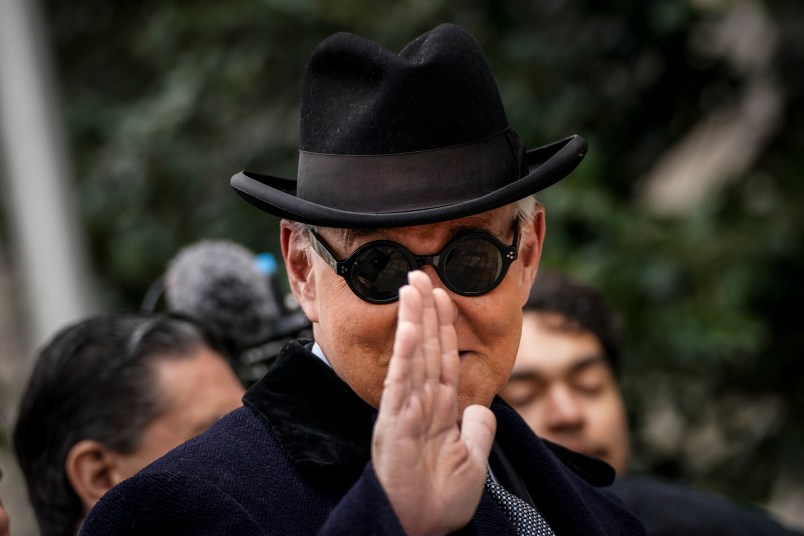Newly revealed portions of the Mueller report serve as a reminder of where the investigation stopped short in its probe of GOP operative Roger Stone.
The portions — which had been redacted last year due to secrecy surrounding Stone’s then-ongoing prosecution — reveal both that Stone told President Trump and other high-ranking members of Trump’s 2016 election bid that Wikileaks intended to release unspecified, embarrassing information about Hillary Clinton, and that the special prosecutor was unsure whether to conclude that President Trump lied about it.
Former federal prosecutors familiar with the newly revealed portions of the report described to TPM how the sections highlight the value that a direct interview of President Trump would have had, and perhaps point to the special counsel’s own lack of willingness to push the issue.
Patrick Cotter, a former federal prosecutor in Manhattan, described Mueller as “Hamlet,” noting that “he’s so conflicted and he respects the presidency so much.”
President Trump agreed to answer a series of questions submitted by the special counsel, in which he claimed to have no recollection of discussing Wikileaks with Stone during the campaign.
Stone has also attributed his statements about Wikileaks to “puffery,” saying that he had no special knowledge of what was to come.
The sequence of events went to the heart of what Mueller was investigating: Russian interference in the 2016 election and potential cooperation in that by the Trump campaign.
But the special counsel wasn’t so sure of how to construe President Trump’s response. In one passage released on Friday, prosecutors wavered between concluding that President Trump had simply forgotten, or that he lied about the matter.
“It is possible that, by the time the president submitted his written answers two years after the relevant events had occurred, he no longer had clear recollections of his discussions with Stone or his knowledge of Stone’s asserted communications with WikiLeaks,” the Mueller report reads. “But the president’s conduct could also be viewed as reflecting his awareness that Stone could provide evidence that would run counter to the president’s denials and would link the president to Stone’s efforts to reach out to WikiLeaks.”
Cotter told TPM that interviewing President Trump could have provided a resolution to the dilemma.
“What they’re indicating is that they had an open question,” Cotter said. “Either the President lied — in which case it could be a crime, obstruction — or, on the other hand, if he just made an honest mistake, that’s not a crime,” Cotter added, saying that in similar situations, prosecutors typically gather corroborating accounts before confronting the subject with what they believe to be true.
The newly revealed sections provide corroborating accounts from former Trump lawyer Michael Cohen and deputy campaign manager Rick Gates. Both recalled Trump, starting in early June 2016, holding phone calls with Stone in which the longtime GOP provocateur told the candidate that Wikileaks would bring something “big” to the campaign.
The revelations suggest that Trump and his inner circle were aware of efforts to damage the Clinton campaign, and of Stone as a potential facilitator of that effort.
Cotter described Mueller as “Hamlet,” noting that “he’s so conflicted and he respects the presidency so much.”
He added that if charging the President is off the table, “you might say to yourself, is it worth trying to get more interviews with the President?”
“As a practical matter, it would have been futile,” Cotter added.
Nick Akerman, a former Watergate prosecutor who interviewed Stone as part of that investigation, noted that the record showed “multiple calls between Trump and Roger Stone over that period of the campaign.”
“Trump was so engaged on the Wikileaks issue throughout the entire campaign,” Akerman added, saying that he did not understand why the investigation did not push further on Trump’s answers regarding Stone and Wikileaks.
The stakes remain high for Stone. He’s scheduled to report to prison in eight days, on June 30.
The longtime political trickster said on Sunday night that he intends to ask for a delay due to the COVID-19 pandemic, while President Trump has publicly suggested that he may grant Stone a pardon.






